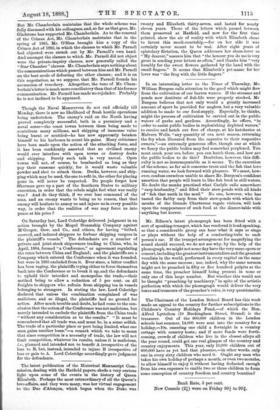On Saturday last, Lord Coleridge delivered judgment in an action
brought by the Mogul Steamship Company against M`Gregor, Gow, and Co., and others, for having "bribed, coerced, and induced shippers to forbear shipping cargoes in -the plaintiff's vessels." The defendants are a number of private and joint-stock shipowners trading to China, who, in A.pril, 1884, formed "a Conference," or agreement regulating the rates between China and England; and, the plaintiffs are a Company which entered the Conference when it was founded, but were in 1885 excluded from it. Ever since, a bitter conflict has been raging, the plaintiffs trying either to force themselves back into the Conference or to break it up, and the defendants to uphold their interdict and monopolise the trade,—their method -being to allow a reduction of 5 per cent. on All freights to shippers who refrain from shipping tea in vessels belonging to strangers. In stating the law, Lord Coleridge declared that unless the combination complained of was malicious, and so illegal, the plaintiffs had no ground for action. After much trouble and doubt, he had come to the con- clusion that the action of the Conference was not malicious, but merely intended to exclude the plaintiffs from the China trade "without any consideration as to the results." "It must be -remembered that all trade was, and must be, in a sense selfish. 'Me trade of-a particular place or port being limited, what one man gains another loses,"—a remark which we take to mean that since competition is a necessity of trade, the law will not limit competition, whatever its results, unless it is malicious, i.e., planned and intended not to benefit A irrespective of the loss to B, but, instead, intended to injure B irrespective of loss or gain to A. Lord Coleridge accordingly gave judgment for the defendants.


































 Previous page
Previous page